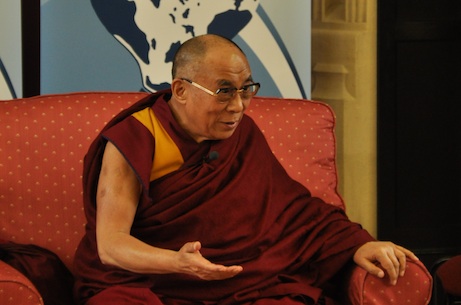
His Holiness the 14th Dalai Lama told the Global Scholars Symposium that the 20th century was one of us and them and that this century people need to work together to face global challenges.
His Holiness the 14th Dalai Lama told the Global Scholars Symposium today that the 20th century was focused on us and them divisions and that the new century required people to come together to tackle global challenges.
Speaking at the Cambridge Union, the Dalai Lama said reducing the gap between rich and poor was the biggest challenge of the 21st century. He said there was a very important role for scholars, but that they needed to ensure information about their research reached a wider audience. Asked if he felt this was a lot of responsibility, he said: “Each of us has a moral responsibility to look after the other seven billion on the planet. We are all interdependent.”
The Dalai Lama is one of the keynote speakers at this year’s GSS. The Symposium was founded by Gates Cambridge Scholars and is this year hosted by them, and brings together international schoalrs studying in the UK.
The Dalai Lama also said the current education system was “inadequate” and too much focused on material ends. It needed more emphasis on ethics and teaching children from nursery up to university level about human values such as compassion. This could help in combatting the kind of conflict seen around the world.
The Dalai Lama spoke about research being conducted with universities in India looking at ways to introduce moral education into the curriculum. He said this must be secular in focus to have more universal appeal and hoped that in the next two years it would be possible to convert the research into practice. Scientific research showed people who were focused less on their own material interests were happier.
At an earlier press conference, he also talked about the research into secular ethics and compassion being conducted by the Mind & Life Institute which he co-founded over 25 years ago to promote and support “rigorous, multi-disciplinary scientific investigation of the mind which will lead to the development and dissemination of practices that cultivate the mental qualities of attention, emotional balance, kindness, compassion, confidence and happiness”.
He said: “The existing education system is not adequate. We need a secular education from kindergarten to university level which offers some sort of teaching in moral ethics. If it is based on religion it will not be universal. Through education humanity can become more compassionate.”
On Tibet, he said he continued to be in favour of dialogue. He did not believe in independence for Tibet but in “meaningful self rule” and he felt that censorship by the Chinese was what prevented a positive discussion on the way forward. “Chinese people have every right to know the reality of the situation in Tibet and to judge if it is right or wrong. Censorship is immoral,” he stated. He also called for China’s judicial system to be “uplifted to international standards” and said this would offer greater protection to the poor and weak.
Asked about his position on self-immolation by pro-independence supporters, he said he did not encourage it and that he didn’t think it would have the effect desired, but he would not criticise those who did it because the reasons why had to be understood.
Symposium
Other keynote speakers at the symposium are Sir Tim Hunt, 2001 Nobel Prize in Physiology or Medicine, Tony Juniper,campaigner, writer and sustainability advisor,His Excellency Gordon Campbell, Canadian High Commissioner to the UK, Justice Goodwin Liu, Associate Justice of the California Supreme Court, Professor Cindi Katz, Professor of Geography, Environmental Psychology, Women’s Studies and American Studies, Wanjira Mathai, daughter of Nobel Peace Prize winner and Green Belt Movement founder Wangari Maathai and Wes Moore, youth advocate, army veteran and author of the New York Times bestseller The Other Wes Moore. Tim Costello, CEO of World Vision Australia has had to pull out due to unforeseen circumstances.
The keynote speeches will be available online through the GSS youtube channel.
A post-conference publication will also be released which aims to provide scholars and speakers with an overview of the symposium, as well as to encourage the development of ideas and issues that were discussed at GSS. It is likely to include editorials on the keynote talks, written submissions from delegates, and pictures of the symposium. The publication will be produced by scholars representing a wide range of fields and scholarship programmes, and will be available online in June.
The theme of this year’s event, which runs until 21 April, is The Next 30 Years: Bridging Ideas to Action and focuses on how Scholars can transform the ideas of today into action for tomorrow and use their careers to make positive changes in the world.
The aim of the GSS is to bring leading scholars together who are studying on the Chevening, Churchill, Clarendon, Commonwealth, Fulbright, Gates Cambridge, Marshall, Rhodes and Weidenfeld Scholarship programmes for three days of interactive talks, debates and interdisciplinary workshops.
Executive committee member Toby Norman says: “The Global Scholars Symposium is a unique chance for students to step out of the ivory tower and think seriously about how their research and careers can contribute meaningfully to solving global challenges. So much of the work and study in graduate education is incredibly narrowly focused on specific academic subfields, but solving the challenges of the 21st century is going to require broad and ambitious interdisciplinary thinking. This is our chance to bridge some of those divides and teach ourselves, in a conference organised for students, by students, reaching out to some of the greatest leaders and thinkers of our time.”
For more information, go to www.globalscholars.co.uk and to view the promotional video, click here.












